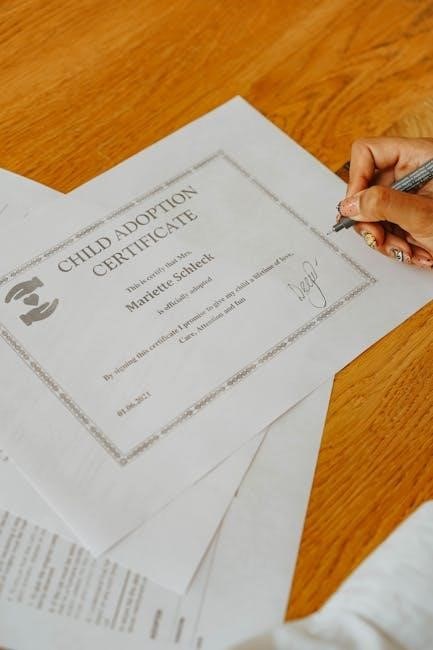MA Trustee Certificate Forms are essential legal documents used in Massachusetts to certify trustee authority, ensuring compliance with state laws and proper notarization for authenticity.
1.1 Overview of Trustee Certificates in Massachusetts
A trustee certificate in Massachusetts is a legally binding document that verifies the authority of a trustee to act on behalf of a trust. It outlines the trustee’s powers, responsibilities, and limitations, ensuring compliance with state laws. This certificate is often required for legal proceedings, financial transactions, and property management. It serves as proof of the trustee’s role and is typically notarized to authenticate its validity. The document is essential for maintaining transparency and accountability in trust operations.
1.2 Importance of Trustee Certificate Forms in Legal Proceedings
Trustee certificate forms are crucial in legal proceedings as they serve as official proof of a trustee’s authority to act on behalf of a trust. Courts, financial institutions, and government agencies often require these documents to verify the trustee’s legal capacity. They ensure compliance with state laws and regulations, providing clarity in transactions and property matters. Properly notarized certificates authenticate the trustee’s role, protecting all parties involved and preventing potential legal disputes. Their accuracy is essential for maintaining trust integrity and ensuring smooth legal processes.

Key Components of MA Trustee Certificate Forms
MA Trustee Certificate Forms include essential sections like trustee details, powers, notarization, and signatures, ensuring compliance with Massachusetts legal standards and proper authentication of trustee authority.
2.1 Essential Information Required in the Form
The MA Trustee Certificate Form requires detailed information, including trustee names, addresses, and signatures, as well as the trust’s name, date, and purpose. Notarization is mandatory, involving a notary’s seal and signature to authenticate the document. Additional details may include specific powers granted to the trustee and any relevant legal references, ensuring compliance with Massachusetts state laws and avoiding potential legal complications. Accuracy is critical to maintain the document’s validity and enforceability.
2.2 Structure and Format of the Certificate
The MA Trustee Certificate Form typically follows a standardized structure, beginning with the heading “Trustee’s Certificate” and including sections for trustee details, trust information, and notary acknowledgment. The document is formatted in a formal, professional layout, often with clear headings and bullet points for clarity. Standard fonts and margins are used to ensure readability and compliance with Massachusetts legal standards. Proper spacing and organization are essential to maintain the document’s professional appearance and legal validity.

How to Obtain MA Trustee Certificate Forms
MA Trustee Certificate Forms can be obtained from official Massachusetts government websites, legal document platforms, or through legal professionals specializing in trust documentation.
3.1 Sources for Downloading the Forms (Official Websites, Legal Platforms)
MA Trustee Certificate Forms can be downloaded from official Massachusetts government websites, legal document platforms, and trusted repositories. Official state websites ensure authenticity and compliance with local laws. Legal platforms like MCLE or REBA often provide verified templates. Additionally, document repositories and legal aid sites may offer downloadable versions. Always verify the source to ensure the form is current and valid for legal purposes.
3.2 Steps to Access and Print the Forms
To access MA Trustee Certificate Forms, visit official Massachusetts government websites or legal document platforms. Use search terms like “MA Trustee Certificate Form PDF” to locate the document. Download the form by clicking the provided link. Ensure the form is current and compliant with state laws. Print the document on standard paper and fill it out carefully, adhering to instructions for notarization and signature requirements. Verify all details before submission.
Filling Out the MA Trustee Certificate Form
Ensure accuracy by providing trustee names, dates, and relevant details. Signatures and notarization are mandatory for authenticity, adhering to Massachusetts legal standards and procedures.
4.1 Detailed Instructions for Completing Each Section
Start by entering the trustee’s full name, address, and date. Provide detailed information about the trust, including its name and date of establishment. Clearly state the trustee’s authority and responsibilities; Ensure all signatures are notarized, and attach any required documents. Use black ink for clarity and legibility. Double-check all fields for accuracy before submission to avoid delays or legal issues.
4.2 Common Mistakes to Avoid During Completion
- Incomplete or inaccurate information, such as missing trustee names or addresses.
- Failure to notarize signatures, rendering the document invalid.
- Illegible handwriting, which can lead to delays or rejection.
- Neglecting to attach required supporting documents or amendments.

Legal Requirements for MA Trustee Certificates
MA Trustee Certificates must be notarized and comply with Massachusetts state laws, ensuring authenticity and legal validity for trustee actions and document submissions.
5.1 Notarization and Signature Requirements
MA Trustee Certificates require notarization to ensure authenticity, with the notary public verifying the identity of the signer. Signatures must be original and executed in the presence of a notary. Trustees and witnesses must sign the document, with their names clearly printed alongside signatures. Proper notarization ensures legal validity, while improper signatures can lead to challenges in court. Massachusetts state laws mandate strict adherence to these requirements to maintain the integrity of the trustee certificate.
5.2 Compliance with Massachusetts State Laws
MA Trustee Certificates must comply with Massachusetts state laws, ensuring all legal standards are met. The document must adhere to specific requirements outlined in REBA Form 20 for nominee trusts. Failure to comply may result in legal challenges or invalidation of the certificate. Proper execution and notarization are critical to maintaining compliance, as Massachusetts law mandates strict guidelines for trustee certificates to protect all parties involved and uphold the legal system’s integrity.
Role of Notaries in Trustee Certificate Authentication
Notaries play a crucial role in authenticating trustee certificates, verifying identities, and ensuring the document’s legitimacy. Their stamp and signature confirm compliance with legal requirements, maintaining trust and integrity.
6.1 Responsibilities of Notaries in Certifying Trustee Documents
Notaries are responsible for verifying the identity of signatories, ensuring documents are signed voluntarily, and authenticating trustee certificates. They must witness signatures, confirm the document’s accuracy, and affix their official seal. This process ensures legal compliance and maintains the integrity of the certificate, preventing fraud and ensuring trust in the document’s authenticity.
6.2 Best Practices for Notarization
Best practices include verifying the signer’s identity, ensuring they understand the document, and confirming no coercion. Notaries must accurately complete the certificate, use official seals, and record details in their journal. Maintaining professionalism, ensuring document integrity, and adhering to state laws are crucial. Proper notarization ensures authenticity and compliance, safeguarding legal rights and preventing disputes.

Execution and Filing of the Trustee Certificate
Proper execution involves notarization and signature authentication, ensuring compliance with Massachusetts state laws. Filing requires submission to relevant authorities for legal validation and record-keeping purposes.
7.1 Steps for Proper Execution of the Document
To ensure the MA Trustee Certificate is properly executed, follow these steps:
- Have the document notarized by a licensed notary public to authenticate signatures.
- Obtain signatures from all designated trustees and witnesses, if required;
- Verify that all information is accurate and complete before signing.
- Ensure compliance with Massachusetts state laws and notarization requirements.
This process guarantees the document’s validity and admissibility in legal proceedings.
7.2 Filing the Certificate with Relevant Authorities
Filing the MA Trustee Certificate with the appropriate authorities is crucial for legal validation. Submit the original document to the relevant county clerk, probate court, or other designated offices. Ensure compliance with local regulations and maintain a copy for personal records. Proper filing confirms the trustee’s authority and provides a public record of the trust’s governance. This step is essential for upholding legal integrity and facilitating future references or disputes.

Managing and Storing the Trustee Certificate
Store the MA Trustee Certificate securely, using fireproof safes or encrypted digital storage. Organize documents for easy retrieval, ensuring confidentiality and compliance with legal requirements.
8.1 Best Practices for Document Storage
Store MA Trustee Certificates in secure, fireproof safes or encrypted digital storage solutions. Ensure documents are organized with clear labels and stored in easily accessible, climate-controlled environments. Use waterproof containers to protect against moisture damage. Regularly back up digital copies to prevent data loss. Maintain a centralized filing system for physical documents, and limit access to authorized individuals only. Always verify the integrity of stored documents periodically.
8.2 Retrieval and Duplication of the Certificate
To retrieve the MA Trustee Certificate, ensure secure digital backups and labeled physical copies stored in accessible locations. When duplicating, verify the document’s integrity and accuracy. Use certified photocopy processes, and consider notarization for official duplicates. Maintain a log of retrieved and duplicated certificates for record-keeping. Ensure all copies are stored securely to prevent unauthorized access or tampering. Always cross-reference originals before issuing duplicates to maintain legal validity and compliance with state requirements.

Legal Implications of Trustee Certificates
Legal implications of Trustee Certificates involve consequences of errors or improper notarization. Proper documentation ensures compliance with Massachusetts laws and protects all parties’ rights.
9.1 Consequences of Incorrect or Incomplete Certificates
Incorrect or incomplete Trustee Certificates can lead to legal challenges, delays in proceedings, and financial penalties. Errors may result in the invalidation of the document, requiring re-filing and additional costs. Inaccuracies can also lead to disputes among beneficiaries or trustees, potentially harming trust administration. Proper compliance with Massachusetts laws and notarization requirements is essential to avoid these consequences and ensure the certificate’s validity and enforceability.
9.2 Protecting Rights Through Proper Documentation
Accurate and complete Trustee Certificates safeguard the rights of all parties involved, ensuring clear authority and accountability. Proper documentation prevents misunderstandings and legal disputes, protecting beneficiaries’ interests and trustees’ responsibilities. Adhering to Massachusetts legal standards guarantees the document’s enforceability, providing a reliable framework for trust administration and fostering trust among all stakeholders. This diligence ensures that the rights and obligations outlined are upheld without ambiguity or contention.
10.1 Summary of Key Points
MA Trustee Certificate Forms are critical for legal processes in Massachusetts, ensuring trustee authority and compliance with state laws. Proper notarization and execution are essential to validate these documents. Understanding the structure, requirements, and legal implications is vital for accurate completion. Seeking professional advice can help navigate complex scenarios, ensuring all obligations are met. These forms play a pivotal role in maintaining trust integrity and adhering to legal standards, making them indispensable for legal and estate planning matters.
10.2 Final Tips for Using MA Trustee Certificate Forms
Always ensure accuracy when completing MA Trustee Certificate Forms to avoid legal complications. Double-check all information and seek professional advice if unsure. Properly notarize and execute the document to maintain its validity. Store the certificate securely and make copies for safekeeping. Familiarize yourself with Massachusetts state laws to ensure full compliance. By following these steps, you can effectively utilize the form and safeguard the trust’s integrity and legal standing.
Additional Resources
Visit official Massachusetts government websites or legal platforms for downloadable MA Trustee Certificate Forms and detailed instructions, ensuring accurate and compliant document preparation and execution.
11.1 Recommended Websites for Further Information
For reliable information, visit official Massachusetts government websites, such as Mass.gov, or legal platforms like Massachusetts Courts. These sites provide downloadable MA Trustee Certificate Forms, detailed instructions, and legal guidelines. Additionally, legal resource platforms like MCLE offer comprehensive guides and updates on trust documentation. Ensure you use trustworthy sources for accurate and compliant document preparation.
11.2 Legal Consultation and Professional Advice
Consulting a legal professional is crucial for ensuring compliance with Massachusetts trust laws. Attorneys specializing in estate planning or trust law can provide tailored advice. For additional guidance, resources like the Massachusetts Bar Association or legal firms such as Rico, Murphy, Diamond and Bean offer expertise. Professional advice helps avoid legal complications and ensures proper execution of trustee certificates, protecting all parties involved.
